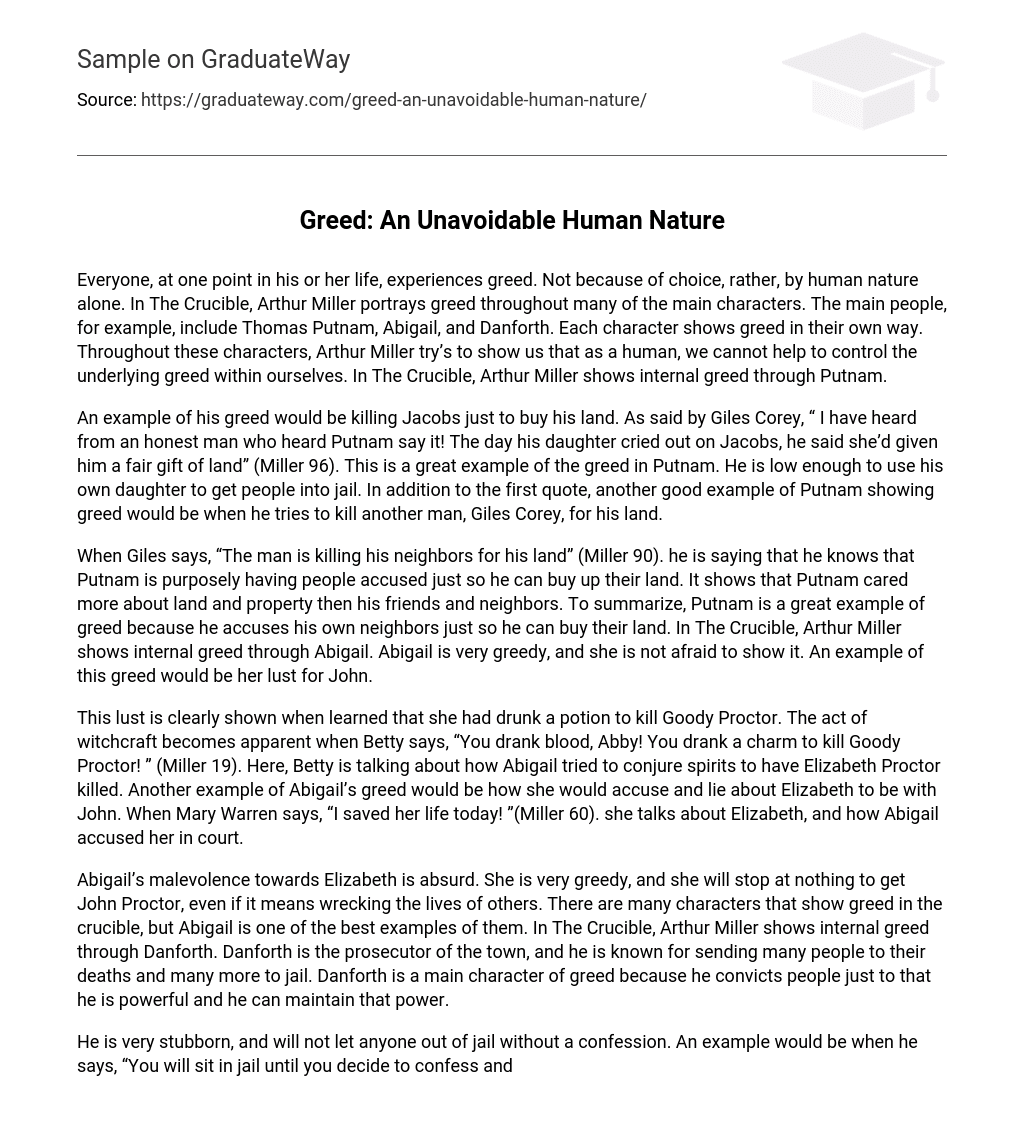In The Crucible by Arthur Miller, greed is a common experience for everyone due to human nature. Characters like Thomas Putnam, Abigail, and Danforth are examples of individuals who demonstrate greed in various ways. Arthur Miller aims to convey through these characters that as humans, we are unable to suppress our innate greed. In the case of Putnam, The Crucible reveals his internal greed.
An instance of his greed can be observed in his ruthless act of killing Jacobs solely to acquire his land. As quoted by Giles Corey, “I have heard from an honest man who heard Putnam say it! The day his daughter cried out on Jacobs, he said she’d given him a fair gift of land” (Miller 96). This serves as a prominent illustration of Putnam’s avarice, as he stoops so low as to exploit his own daughter in order to incarcerate innocent individuals. Furthermore, alongside the aforementioned quotation, another compelling example of Putnam’s manifestation of greed can be seen in his endeavors to eliminate another man, Giles Corey, solely with the intention of acquiring his land.
According to Giles, Putnam is intentionally accusing people in order to acquire their land, displaying his prioritization of property over his friends and neighbors (Miller 90). This demonstrates Putnam’s greed, as he manipulates his own community to fulfill his desires. Similarly, in The Crucible, Arthur Miller portrays Abigail as a character driven by internal greed. Abigail’s insatiable greed is evident in her intense desire for John.
This passage highlights Abigail’s intense desire and willingness to go to extreme measures. It is revealed that she consumed a potion with the intention of causing the death of Goody Proctor, showcasing the presence of witchcraft. Betty reinforces this notion by exclaiming, “You drank blood, Abby! You drank a charm to kill Goody Proctor!” (Miller 19). This statement refers to Abigail’s attempt to summon spirits to eliminate Elizabeth Proctor. Additionally, Abigail’s insatiable greed is exemplified through her false accusations and lies about Elizabeth in order to be with John. When Mary Warren asserts, “I saved her life today!” (Miller 60), she is referring to Elizabeth and how Abigail falsely accused her during the court proceedings.
Abigail’s hostility towards Elizabeth is preposterous. She demonstrates excessive greed and is willing to do anything to possess John Proctor, even if it means destroying the lives of others. In Arthur Miller’s play, The Crucible, greed is depicted through various characters, with Abigail exemplifying it exceptionally well. Another character who embodies internal greed is Danforth, the town’s prosecutor. Known for condemning numerous individuals to death or imprisonment, Danforth abuses his power in order to maintain his authority.
In the text, it is mentioned that Danforth is extremely stubborn and refuses to release anyone from jail without a confession. As evidence, a quote is provided: “You will sit in jail until you decide to confess and answer all questions” (Miller 98). This quote demonstrates his unwillingness to admit he could be mistaken or challenged. Another indication of Danforth’s greed is highlighted in his statement: “And do you know there are 72 people condemned to die by my signature?” (Miller 87). Clearly, Danforth boasts a significantly high conviction rate. He exhibits great incompetence and avarice, prioritizing sending individuals to their demise over admitting his own fallibility.
In addition, Danforth takes pride in his death rate and is too selfish to let it go. He serves as a prime example of greed since he boasts about his conviction rate and authority and would rather sacrifice lives than admit any wrongdoing. Ultimately, people cannot help but be consumed by inherent greed. Miller demonstrates this through the characters of Putnam, Abigail, and Danforth. Greed is an inevitable aspect of human nature. Although it may occasionally be disguised, more often than not, it is beyond our control.





